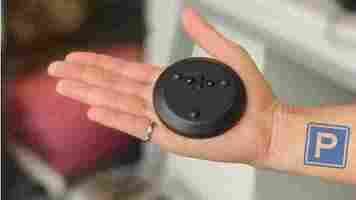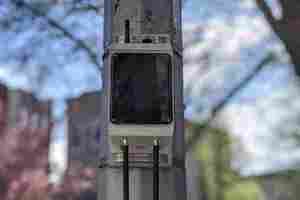Sidewalk Labs can help you find empty parking spots downtown in real-time
This article was originally published by Sarah Wray on Cities Today , the leading news platform on urban mobility and innovation, reaching an international audience of city leaders. For the latest updates follow Cities Today on Twitter , Facebook , LinkedIn , Instagram , and YouTube , or sign up for Cities Today News.

Alphabet-owned urban tech company Sidewalk Labs has launched a new sensor to help cities improve parking and curb management.
Pebble provides real-time data about parking space availability, with a dashboard to give municipalities, operators and real estate developers an understanding of historical parking patterns.
Nick Jonas, Senior Creative Technologist at Pebble, said in a blog post : “These insights can help communicate space availability to customers, reduce circling, and create shared parking zones that minimise the number of spaces built in the first place.”
Parking sensors are not new, but Sidewalk Labs says its solution is easier to install and cheaper than existing products on the market.
The wireless Pebble system consists of individual 2.8-inch Pebble sensors that can be placed on a surface using adhesive. The solar-powered Pebble gateway uses the cellular network, so it can be attached to a pole without running new wires or trenching through pavement.
Once in place, the sensors relay the presence, or absence, of a vehicle in real time.
Several Pebble pilots are ongoing but further details are not being disclosed for now.


The parking problem
Some estimates suggest that circling for parking can account for up to 30 percent of traffic congestion in cities and a more recent study found between 9 and 56 percent of traffic could be cruising for parking. As well as congestion this contributes to increased emissions.
Pebble’s data can be integrated into navigation apps through an API, helping drivers navigate directly to an open space.
Real-time parking information can also alert drivers when spaces are limited before they even leave home, encouraging them to use alternative travel modes.
Curb management has become a priority during the pandemic and Sidewalk Labs says Pebble enables cities to implement flexible programs such as dynamic pricing or real-time reservations for commercial smart loading zones.
Cities give a significant amount of space over to parking , and it’s expensive. Real estate developers can use the Pebble data to create shared parking zones and build less parking. For instance, a restaurant that does most of its business at night might share a parking garage with an office that’s open during the day, rather than each building their own. Data could help make the case for this.
“We think a low-cost, easy-install, privacy-preserving way to measure parking and curb space can help get any number of new ideas for more sustainable and innovative cities off the ground,” said Jonas.
Privacy
Sidewalk Labs is keen to stress privacy measures. Pebble only collects information on whether or not a vehicle is there, said Jonas.
“The system uses no cameras or other ways to identify a person or vehicle. Consistent with our approach to data minimization, there simply wasn’t a need for such data to achieve the goal of vehicle detection,” he commented.
Jonas added that Sidewalk Labs is also looking at ways to extend this “privacy-sensitive approach” to parking payment and permits.
Concerns over privacy and personal data dogged Sidewalk Labs’ smart city project in Toronto. The plans to create a smart neighborhood in a disused area of Toronto’s Quayside district were dropped in May last year, with Sidewalk Labs CEO Dan Doctoroff citing “unprecedented economic uncertainty”.
Since the demise of the large-scale Toronto project, Sidewalk Labs has announced several vertical-focused products aimed at improving cities. These include Mesa , which uses real-time data and automation for energy management in commercial spaces, and Delve which deploys machine learning to optimise urban project planning.
Last month, Sidewalk Labs spinout Replica announced it had secured US$41 million in Series B funding and plans to expand the urban data platform to Europe and Asia.
Do EVs excite your electrons? Do ebikes get your wheels spinning? Do self-driving cars get you all charged up?
Then you need the weekly SHIFT newsletter in your life. Click here to sign up .
EU fines German car cartel $1B over emissions collusion, but spares Daimler for snitching
The EU has slapped four leading German carmakers with a combined fine of $1 billion ( €875 million) for colluding to prevent the deployment of clean emissions technology.

Up front: The European Commission ruled that Daimler, BMW, and the Volkswagen Group (Volkswagen, Audi, and Porsche) had collectively agreed to limit the development of tech that could restrict pollution from gasoline and diesel cars.
Daimler, however, avoided a fine after revealing the group’s existence.
Margrethe Vestager, Executive Vice-President of the Commission, said the collusion broke EU antitrust rules:
The VW Group received the majority of the fine — $594m (€502m) — while BMW got the remaining $594m (€373m).
Quick take: A $1 billion fine is obviously no small sum, but still less than some carmakers had feared. According to the Financial Times , BMW alone had initially set aside $1.67 bn (€1.4bn) for the proceedings.
The fines are also low compared to those dished out during Dieselgate. Volkswagen says the emissions scandal has cost it a total of $37bn ( € 31.3bn) in fines and settlements.
Tidal in Teslas is great, but we need MORE music streaming apps
For those of you who own a Tesla and have been wishing for an alternative to Spotify, we have some good news: Tidal is now supported.

The new in-car app is part of Tesla’s 2021.40 software update, released on Tuesday.
Here’s the release note:
For audiophiles Tidal’s integration is a BIG improvement. While the two platforms offer about the same selection of artists , Tidal is simply better in terms of sound quality.
Spotify’s audio tops at approximately 320kbps, even with the Premium subscription, which basically results in MP3-quality sound.
In contrast, Tidal’s most expensive plans, HiFi and Master, offer lossless audio quality at 1,4111kbps and 9,216kbps, respectively. This means that you get high-res CD quality.
Spotify is also planning to go HiFi , but that hasn’t happened yet.
But to be fair, there’s a lot more than just streaming quality that factors into choosing the right music platform. Music discovery features, pricing, and ease of use (especially while driving) all play a big part. And finally, you might not even be able to tell the difference between normal streaming and lossless audio .
It’s a bit ridiculous that Tesla owners are stuck with only two options for music streaming — especially when we’re used to the wealthy smorgasbord of video streaming services at home, like Netflix, Hulu, Plex, Disney+, and more.
And on top of that, I feel there’s a bigger room for creativity when it comes to creating new methods to serve drivers their favorite beats than with video streaming at home. It’s a completely different experience listening to music on your phone while walking, compared to blasting it in your car stereo — both in terms of operating the platform and its vibe.
Let me suggest here the integration of Amazon Music and Apple Music. They offer high-res audio quality similar to that which is currently offered by Tidal Hi-Fi, and are also cheaper.
So I’d like to see more services take a crack of making more use of Teslas’ music listening capabilities, starting with Amazon Music and Apple Music.
I feel like they have the in-house capabilities of overhauling the experience, and it doesn’t hurt they both offer high-res audio quality similar to that which is currently offered by Tidal Hi-Fi, just cheaper.
But besides the inclusion of Tidal, the new Tesla update introduced some nifty features:
You can find the summary of the updates here .
Do EVs excite your electrons? Do ebikes get your wheels spinning? Do self-driving cars get you all charged up?